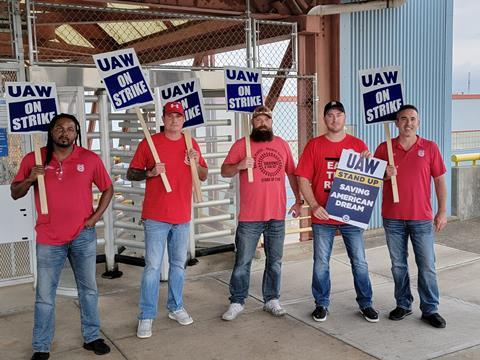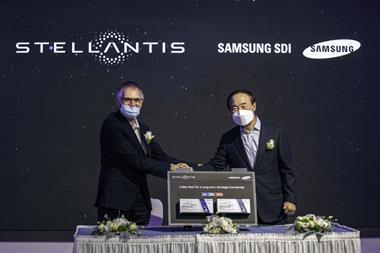Members of the United Auto Workers union (UAW) have ratified the tentative deals with GM, Ford and Stellantis following weeks of strikes against the Detroit Big Three, but an expert warned the damage may already be done for some suppliers.

Months after the strikes first began, the UAW said that 64% of workers at the three automakers voted in favour of ratifying the deals. The new contracts will run through April 2028 and include a 25% increase in base wages and cost-of-living adjustment (Cola) payments.
“After years of cutbacks, months of our Stand Up campaign and weeks on the picket line, we have turned the tide for the American autoworker,” said Shawn Fain, president, UAW.
While the ratifications will ease tensions in the manufacturing and supply chain, the three OEMs and their suppliers will now be under pressure to get their facilities back up and running. In fact, the impact of the recent strikes could already have left suppliers at financial risk, according to supply chain and manufacturing legal expert Linda Watson, attorney at law at Clark Hill. “Some suppliers may already be facing financial problems, and their banks and financers will be asking if and when they’ll be back at full volume and putting the pressure on,” Watson told Automotive Logistics.
She said that OEMs may still need to help out the supply chain. “If volumes are on par or higher because OEMs want to play catch up, it could put additional stress on suppliers as they may need to pay a premium to get more of the raw materials in less time,” Watson said. “They may also incur costs in having to pay to deliver more parts to the OEMs. There is also an increase in labour costs if you are trying to rebuild your workforce and having to pay overtime. If you miss firm orders, there’s financial impact built into the contract with the OEM. Suppliers need to be aware of these potential costs.”
Watson warned that OEMs may start enforcing more cost efficiencies, and added that the strikes must be looked at in the wider context too. “There is still a lot at play and you can’t look at this in a vacuum,” she said. “The UAW contracts are one piece of the puzzle, but there are other cost issues also affecting the industry, including the transition to EVs and the capital investment in that, the consumer demand for affordable cars, and less consumer demand overall for vehicles.”

She added that suppliers can be proactive to help mitigate the expense. “For suppliers, they probably need to sit down and take a look at their sub-suppliers and see what inventory they have. The just-in-time model means that there is not a lot of inventory at a time. My advice to suppliers would be to make sure you’re on the phone with OEMs to get the best picture of what their firm orders are going to look like up front.”
Although all three of the Detroit carmakers took steps to mitigate the cost of the strikes, Watson said this could also affect the makeup of the supply chain. “The three OEMs have taken steps to mitigate this and push volumes on more profitable vehicles. This will trickle down in terms of volume changes in what parts suppliers are making and selling, in alignment with what the OEMs are doing,” she said.
Watson added: “The more proactive suppliers can be, the better off they’ll be in terms of reducing the costs of restarting.”
Meanwhile, read on to find out more details of the ratified deals below.
GM
At GM, the new contract will mean the lowest-paid hourly union workers will see a 158% raise throughout the life of the contract. With Cola payments, by 2028 there will be a top rate of over $42 an hour for production, and over $30 for skilled trades.
On top of this, the union secured increased retirement security, with a 73% to 146% increase in annual company contribution to 401(k) accounts by the end of the agreement. A 401(k) plan is an employer-sponsored, defined-contribution, personal pension account, as defined by the Internal Revenue Code.
In response to the deal, Mary Barra, CEO and chair, GM said: “We are pleased our team members have ratified the new agreement that rewards our employees, protects the future of the business and allows us to continue to provide good jobs in communities across the US. We can now move forward as one team doing what we do best – delivering great products for our customers and winning together.”
Ford
The agreement reached with Ford includes a 150% raise through the term of the contract for the lowest-paid members, with temporary hourly staff hired this year at $16.67 now set to earn over $40 per hour by 2028.

Lower-tiered members at Sterling Axle and Rawsonville facilities will see immediate raises ranging from 53% to 88%. A member with three years seniority at those facilities will, upon ratification, go from $18.96 to $35.58.
A major part of the deal included an $8.1 billion investment into the OEM’s plants by the end of the agreement, particularly to help the transition to EVs.
A statement from Jim Farley, president and CEO, Ford after the ratification said the carmaker is now focused on “getting back to work as one Ford team”. He said: “Thankfully, we are on track to reach full production schedules in the coming days at our assembly plants in Michigan, Kentucky and Illinois that were affected during the strike.”
Stellantis
Finally, Stellantis and the UAW reached a deal that will see the union’s lowest-paid members gain a 168% raise through the agreement.
With Cola, by 2028, the Stellantis workers will have a top rate of over $42 an hour for production and over $50 for skilled trades, an over 30% raise. By the end of this agreement, the starting full-time rate will be over $30 an hour, nearly a 70% bump from today.
Mark Stewart, chief operating officer, Stellantis North America said: “With negotiations now officially behind us, we will focus our full attention on executing our Dare Forward 2030 strategic plan and serving our customers by delivering the high-quality products and technologies they want and expect, especially as we prepare to launch eight all-new electric vehicles in the U.S. market in 2024.”


























![Global[1]](https://d3n5uof8vony13.cloudfront.net/Pictures/web/a/d/s/global1_726550.svgz)













No comments yet